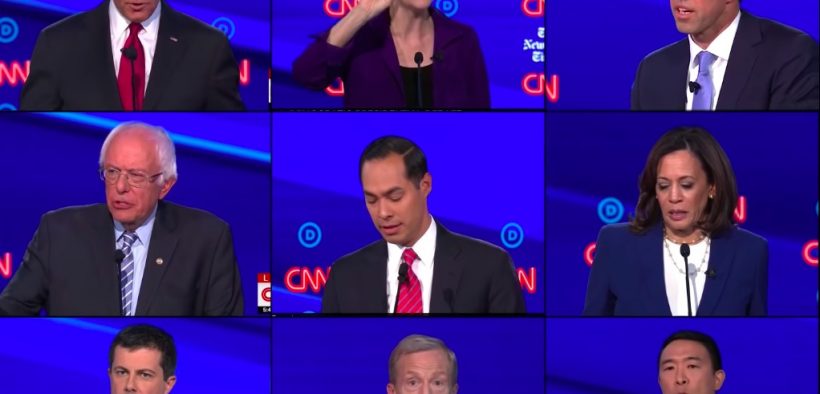What Matters in a President

As citizens, we only get a tiny glimpse into our who our presidential candidates really are. Information warfare is waged by campaigns and the media, who seem to all have an agenda. Yet we are tasked with making a huge decision on who should lead the free world.
How can we cut through the bullshit and make sense of what matters? How should we evaluate a presidential candidate? What factors matter? How much should we weigh one factor against another? It is all very overwhelming which is why most people procrastinate thinking about it until election day or opt-out entirely.
The fact we get to decide for ourselves is the beauty of democracy. The fact that we have to decide for ourselves is the mess of democracy.
I’ve spent my life thinking about how to compare politicians (yes, I know that is super nerdy). Despite spending years in my head on the topic, I’ve only recently begun to try to get scientific about it. I put together this little framework for identifying things about candidates that matter to me. I’ve tried to stick with things that are measurable since things like integrity (which I would love to use) are nearly impossible to measure. Here it is, I hope it helps. I want a candidate who:
Prioritizes Regular People Over the Elite
Where a person spends their time reveals their priorities. Money is, unfortunately, necessary to get elected in this day and age. A politician who raises more money from small donors reveals to me that they prioritize ordinary people over the wealthy.
Data: OpenSecrets tracks all fundraising data, see the 2020 presidential report here.
Works Across the Aisle
An increase in partisanship has led to an increase in gridlock. Fewer solutions are being passed at a time when our problems are growing larger than ever. I think the best solutions incorporate ideas from different perspectives. I truly believe a politician who is willing to listen to other perspectives and work with the other party not only increases their chances of developing quality solutions, but also getting them passed.
Data: Georgetown University has developed a sophisticated way to measure bipartisanship, see the scores here.
Gets Shit Done
Some politicians are especially skilled at shepherding bills through the crazy bureaucratic process to actually become law. They have the determination, relationships and problem-solving ability to navigate the complexities of passing legislation. I think we need more politicians with this skill to help us solve our biggest challenges.
Data: Vanderbilt University and the University of Virginia developed a sophisticated way to measure legislator effectiveness, see the scores here.
Supports Reforms That Depolarize
I think toxic partisanship is the single biggest obstacle to politicians passing big laws that matter. The methods we use to vote, the way we draw districts and the rules around campaigning have a big impact on toxic partisanship. Some methods (like our current ones) make it more likely we elect extreme candidates. Other methods make it more likely reasonable people win election. I want politicians who support changes that would make it easy for reasonable people to get elected. More reasonable people in office mean more solutions passed and a better life for all.
Data: A famed Harvard professor has graded each 2020 presidential candidate on their democracy reform stances, see the grades here.
Has Experience Relevant to Running a Nation
Personally, I’d love a President with executive, legislative, foreign affairs and military experience all rolled into one human. A former CEO, governor, district attorney, congressperson, diplomat and marine would get me real excited. While I don’t think specific experience is necessary for being a good President, having been-there-before matters. A deep understanding of how each complex apparatus — executive, legislative, diplomatic and military — operates, makes it more likely a candidate will be successful in their role as our leader.
Data: Honestly, I think Wikipedia is one of the best sources to look at a candidate’s experience.
Supports My ‘Non-Negotiable’ Positions
There are only a few policy stances that are non-negotiable to me. These are more There are only a few policy stances that are non-negotiable to me. These are more general principles rather than specific policies. If a candidate meets all the criteria above, but does not support the things that matter most to me, I wouldn’t support them.
Data: Good guides that breakdown the policies of each 2020 candidate include: Axios, ProCon, On The Issues, NPR, Politico, Washington Post.
Has Clear Positions on Major Policies
I want to know where a candidate stands on all major policies before deciding if they have earned my vote. I am suspicious of any candidate who won’t publish a clear plan on big policy issues. I actually have more respect for a candidate who has a position I don’t agree with than a candidate who won’t take a position at all.
Data: These same guides do a good job of calling out whose not taking positions on certain issues: Axios, ProCon, On The Issues, NPR, Politico, Washington Post.
Where Science Meets Art
Now that we have our criteria, how do we compare it all against each other? What matters more; experience, prioritizing regular people or policy positions? Welcome to the beautiful mess of democracy, there is no right answer, you get to decide.
Making it Simple
In the past, I wished for an app where I could select what policies and factors matter most to me, then see which candidate I best match with. I scoured the internet for this and couldn’t find it. So I decided to start a company to do just that.
At ChangeRoots, we’re developing a simple app to compare politicians on what matters (plus we do some other cool shit). It launches February 2020. Take a peek at what we’re up to.







